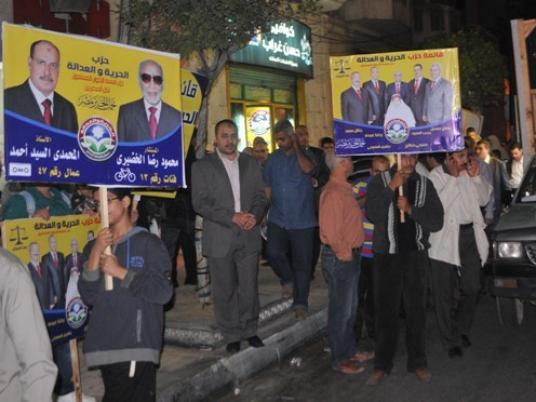
Following tension over allowing international vote monitoring in Egypt's elections, the Egyptian government now says it is welcoming international observers to “witness” the parliamentary polls, slated to kick off tomorrow in some parts of the country.
The tension preceding this decision stems from the perception that international monitoring constitutes foreign interference in Egypt’s internal affairs, a line oft-quoted by foreign ministers of the Mubarak regime and continued under the reign of the Supreme Council of the Armed Forces (SCAF). The line was repeated almost verbatim by SCAF member Mamdouh Shaheen last July when he said that foreign monitors would not be allowed so as to ensure the country's sovereignty.
Abdel Moez Ibrahim, head of the high elections commission, the regulatory body overseeing the elections, announced in a press conference last month that international monitoring would only occur if permission were granted by the relevant “sovereign entities.” The language was ambiguous, but it was widely believed that the sovereign entities were the ruling military council and the interim cabinet.
Later, a directive from the SCAF allowed for foreign “witnessing” of the elections, a term that was deemed more suitable for the scope of the role international observers would play. International observers have welcomed the term, as they feel it to be their role anyway, the difference being that monitors have a mandate to address any violations they see, while witnesses can only issue non-binding reports of them.
International observers must receive permission directly from the Foreign Ministry to participate in observing the elections.
Sanne Van Den Bergh, the field director of the Carter Center, a US-based NGO that monitors elections around the world, said Egypt's Foreign Ministry had approved the center to witness the elections and had communicated the approval to the high elections commission.
“In our understanding, witnessing means the same as observation in sort of the common understanding of what observation is, the internationally accepted definition of that,” she said. “The Carter Center never interferes; our methodology is to observe, to document and to report. Our purpose is to give an impartial assessment of the elections and to basically show international interest in the electoral process and support the process to build confidence amongst Egyptians.”
The Carter Center will have witnesses in the field during the campaign period as well, comprised of between 16 and 20 employees, known as “long-term witnesses.” More witnesses will be brought in when the actual voting begins, according to Van Den Bergh.
While many government leaders have rejected monitors, some candidates say they welcome objective international forces to ensure the election's credibility. “I support this wholeheartedly and anyone with nothing to hide should also support it,” said Emad Gad, who is running for parliament with the Egyptian Social Democratic Party.
Gad dismissed the talk of foreign intervention in domestic affairs as empty echoes from the Mubarak regime which have the effect of “ruining Egypt’s reputation abroad.”
Members of the Egyptian judiciary will be monitoring the elections, a reform included in the March constitutional referendum after the constitutional amendments of 2007 had deemed judicial supervision unnecessary. Additionally, local organizations will be allowed to monitor the elections after getting permission from the semi-official National Council for Human Rights.
“The SCAF has agreed to allow witnessing because they are upset with the term ‘monitoring,'” Gad said. “This will have no real difference on the ground as the international observers [will have the same role as before].”
Bassel Adel, a candidate for the liberal Free Egyptians Party, said he is concerned, though. While he believed that the 28 November election day would not see mass violations, he said he saw violations already being committed on the campaign trail. “Already there are parties using religious buildings for campaigning."
Some candidates say they are comfortable with the lack of international monitors. “We have complete trust in the Egyptian judiciary, and as long as there isn’t mass election-rigging like under the previous [Mubarak] regime, then there shouldn’t be a problem,” said Adel.
“There are many countries that do not have international monitoring and some countries are sensitive about it because they deem it to be interference, and Egyptians have that sensitivity,” Adel added.




